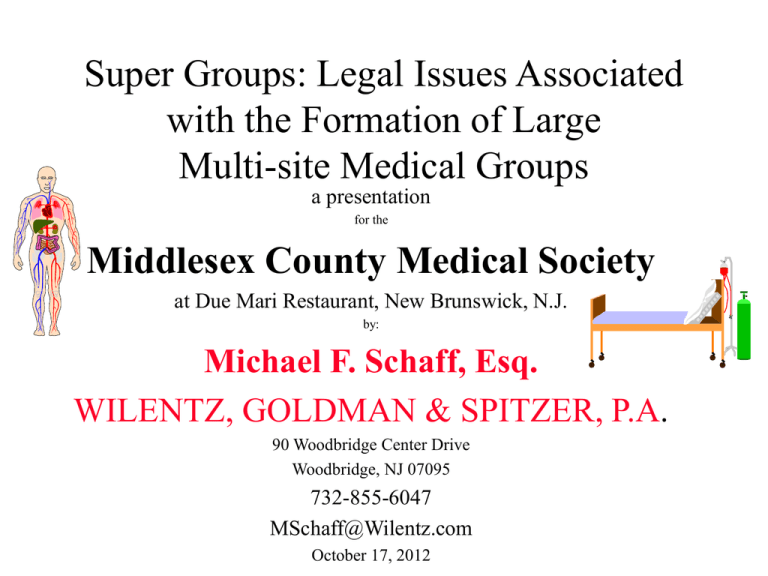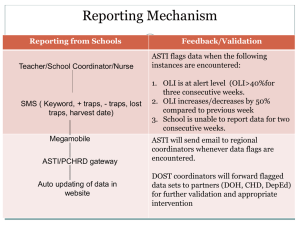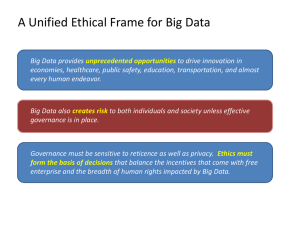Super Groups - Wilentz, Goldman & Spitzer
advertisement

Super Groups: Legal Issues Associated with the Formation of Large Multi-site Medical Groups a presentation for the Middlesex County Medical Society at Due Mari Restaurant, New Brunswick, N.J. by: Michael F. Schaff, Esq. WILENTZ, GOLDMAN & SPITZER, P.A. 90 Woodbridge Center Drive Woodbridge, NJ 07095 732-855-6047 MSchaff@Wilentz.com October 17, 2012 I. Overview • Changes in the Health Care Environment • Physician Associations – Are Super Groups the Answer? • Traps for the Unwary: Assessing prospective Groups • Questions & Answers II. Changes in the Health Care Environment • Managed Care – – – – market penetration provider panels reduced fees consolidation • Greater Efficiency forced by Market – – – – reduced fees reduced staff reduced overhead greater patient volume II. Changes in the Health Care Environment • Regulatory change & uncertainty – Accountable Care Organizations – Medicare/Medicaid will change – Reimbursement Changes III. Physician Associations OPTIONS • Employment in private practice; no ownership • Employment by hospital or other entity • Solo practice • Group Practice – – – – small; 2-5 Drs. medium; 6-15 Drs. large; 16- 25 Drs. Super Groups; 26+ Drs. III. Physician Associations Your CURRENT SITUATION • What do you want? – personal needs – financial needs – career needs • Current Likes & Dislikes • Characteristics – age – culture – personality III. Physician Associations WHAT ALTERNATIVES EXIST? • • • • All’s Fine Sell Practice & Retire Sell Practice & Work Contract Away Administration – Management Service Organization (MSO) – Physician Practice management Company (PPMC) – Join Hospital • Merge or Combine Practice – Into existing Super Group? – Start a new Super Group? III. Physician Associations MAJOR CONSIDERATIONS • Compensation – How much will you make? • Group Practice – Rights & Obligations – Control? • Centralized Management – Benefits – Costs IV. Traps for the Unwary: Assessing Prospective Groups Why Form or Join a Group Practice? • Significant Benefits • Improved Negotiating • Increased Revenue Sources – Ancillary Revenue • Economies of Scale • Shared duties & info. • Coverage • Practice risks • Retirement IV. Traps for the Unwary: Assessing Prospective Groups Why Form or Join a Group Practice? • Significant Disadvantages • Reduced Control – medical – financial • Possible change in compensation structure • Increased Costs- Higher Overhead • Culture “shock” IV. Traps for the Unwary: Assessing Prospective Groups “Culture Shock” • Different styles • Demographics – age – specialties – culture/ethnicity • • • • Decision Making Support staff Office Policies Integration of Information Systems – Practice management systems – Electronic Health Records (EHR) IV. Traps for the Unwary: Assessing Prospective Groups Business Issues • Administrator & Management • Staff Satisfaction • Advisors – legal – accounting – consultants • Quality of Payer Contracts IV. Traps for the Unwary: Assessing Prospective Groups Honeymoon Period • May ease transition • Disassociation planning • Cost/profit center accounting IV. Traps for the Unwary: Challenges in Combining Groups Legal Hurdles • Anti-trust laws – – – – – limits mergers that reduce competition limited exemption for health care professional coalitions Concerns about the use of “pseudo-merger” to engage in illegal price fixing Must do an analysis of increased market power vs. benefits of integration There is a PULL between integration requirement vs. desire for independence • control (decision making) • sharing of profits and losses • clinical, operational and marketing integration IV. Traps for the Unwary: Challenges in Combining Groups Legal Hurdles • Self-referral law “group practice” requirements – – – • • centralized billing & management single taxpayer ID general sharing of overhead Pension plan rules require coordination of plans Taxability of transaction– be careful; structure may have significant tax ramifications IV. Traps for the Unwary: Assessing Prospective Groups Level of Integration • Partially Integrated Medical Group “PIMG” – cost/profit centers • Fully Integrated Medical Group “FIMG” IV. Traps for the Unwary: Combination Models • Top to Bottom Merger is a complete merger. • Division Model is a way to allow existing groups to retain control over various existing elements of their practice, such as staff and billing. • Leasing Assets vs. Merger or Contributions – tax issues IV. Traps for the Unwary: Division Model • Operation as a single legal entity with a single billing number and payroll (referred to as the “LLC”) • Several divisions (one for each existing group) that are not separate legal entities. • Operational control over each division by governance at the division level – each division determining their own method of division-level governance – but subject to the LLC final approval IV. Traps for the Unwary: Division Model (con’t) • Billing and collection is done in the name of the LLC • Buy/sell terms and obligations at – Division-level (for Division Assets) and – Centralized Level (Common Asset Level) IV. Traps for the Unwary: Division Model (con’t) • Cash distributions: – allocated to divisions based on agreed upon mechanism • allocation of division-specific costs and revenues to the division – concerns STARK LAWS & distribution of DHS Revenue unless division has >5 members • allocation of common overhead costs to all divisions based on agreed upon formula – per capita vs. per division vs.per owner vs. per FTE vs. revenue vs.# of staff – allocation of distributions at the division level determined by division-level governance IV. Traps for the Unwary: Division Model (con’t) • Joint exposure to liability – malpractice – overpayment – billing fraud, etc.. • Assets may be kept in existing entities owned by members of a division and leased to the LLC – lease payments will be allocated to the division (should be a wash for the Members of the division) – unwind provision allows for termination of leases during “honeymoon period” or beyond – bank loans secured by an exiting group’s guarantees continue to be secured by those member’s guarantees IV. Traps for the Unwary: Payor Contracting • In general, payor contracts would be at the LLC level • While existing contracts with third party payors must be reviewed in the due diligence process, if the combination of the groups is accomplished by creating the LLC as a new entity (and not by merging the existing entities into the LLC), the pre-combination contracts should not apply to services provided through the LLC. IV. Traps for the Unwary: Assessing Prospective Groups Determination of Ownership • Value of existing practices • Adjustments? • Equal? • Other? • Significance of Ownership – control, compensation & equity IV. Traps for the Unwary: Assessing Prospective Groups Allocation of Control • Centralized Control – Executive or Management Committee • Control at Division Level for daily items • Protection for minority members • Corporate ethics • Business decisions • Medical decisions IV. Traps for the Unwary: Assessing Prospective Groups How is Compensation Determined? • Cost/income allocation – division level – full integration • Activities & status – production – seniority or ownership – non-medical activities • Mechanics – formula – committee IV. Traps for the Unwary: Assessing Prospective Groups How can Employment be Terminated? • Voluntary withdrawal – retirement – honeymoon period • Without Cause • Cause – loss of license, etc... • Disability • Different Standards? • Appeal Procedure? IV. Traps for the Unwary: Assessing Prospective Groups Post-Termination Payments • How Determined? – Business Valuation – Formula • How Allocated? – Ownership Interests – Teermination/Deferred Compensation (Tax issues) – Restrictive Covenant • Funding Issues IV. Traps for the Unwary: Assessing Prospective Groups Applicability of Restrictive Covenants • Area and Duration • Prohibited activities • Liquidated Damages Vs. Injuction • Trial period affect IV. Traps for the Unwary: Assessing Prospective Groups Agreements with Related & Unrelated Parties • Management • Employment – Non-medical staff – Medical staff • • • • Billing & collecting Equipment Leasing Real Estate Labs & ancillary services IV. Traps for the Unwary: Assessing Prospective Groups Agreements with Related & Unrelated Parties -- Concerns • Who owns entities? • Are certain members benefiting disproportionately? • Are non-members benefiting? Are terms “arms length”? • Do transactions comply with laws & regulations? V. QUESTIONS AND ANSWERS Super Groups: Legal Issues Associated with the Formation of Large Multi-site Medical Groups a presentation for the Middlesex County Medical Society at Due Mari Restaurant, New Brunswick, N.J. by: Michael F. Schaff, Esq. WILENTZ, GOLDMAN & SPITZER, P.A. 90 Woodbridge Center Drive Woodbridge, NJ 07095 732-855-6047 MSchaff@Wilentz.com October 17, 2012






